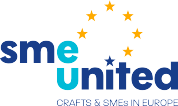Mr Massimo Bezzi, EFESME Vice-President, opened the meeting welcoming the participants and highlighting the importance of EFESME in the defence of the lift sector at EU level, this work is supported also by SBS in the standardisation process.
The seminar was structured in two parts: a general one with the aim to inform SMEs and national associations about the European Standardisation systems and the tools available for SMEs and a second part with a focus on the lift sector.
The event successfully gathered delegates from the European Commission – DG Growth with Mr Jean-François Aguinaga, Head of Unit Standards for Growth and Ms Victoria Piedrafita, Policy Officer Unit for Advanced Engineering and Manufacturing Systems; AENOR (Spanish standardisation body) represented by Mr Javier García, Director of Standardisation and by Ms Virginia Vidal, Head of Management Control Unit; CEN-CENELEC (European Committee for Standardization-European Committee for Electrotechnical Standardization) with Mr Francisco Verdera Mari, Director Strategic Partnerships; SBS with Mr Riccardo Viaggi, SBS Board Member and EBC Secretary General; FEPYMA (Spanish association for elevator SMEs) represented by the President Mr Lorenzo Beltrán Aguirre and EFESME with Mr Giuseppe Iotti, Secretary General.
Presentations about the EU regulatory framework of standards development and the role of national standardisation organisations with concrete examples from the Spanish experience have been showed in the morning.
Standards are technical specifications defining requirements for products, production processes, services or describes in detail a particular method or procedure. These specifications are voluntary; they are developed by industry and market actors following some basic principles such as consensus, openness, transparency and non-discrimination.
The European Commission has an active standardisation policy that promotes standards as a way to better regulation and enhance the competitiveness of European industry. The European standardisation helps to reduce legal compliance costs, improve safety, enhance competition, simplifies access to the Single Market as well as to the global markets and helps to introduce innovative products and services.
The National Standardisation Organisations play an important role in order to introduce standards in each country, by ensuring the transposition of European standards into national standards and certify withdrawal at any conflicting national standard.
There are a bit less than 20 million SMEs in the European Union, which represent 99,8% of all businesses. These SMEs employ 86,8 million people and generates the 57,6% of the gross value added.
European SMEs face several challenges when participating in the standardisation process. It can be difficult to understand the technical complexities because of a lack of knowledge in the standardisation process. SMEs are sometimes also unaware of the benefits brought by standardisation. EFESME, since its creation in 2005 and in the last years through SBS, helps SMEs in representing their interests in the standardisation development both on a technical and on a political level.
EFESME Secretary General presented a global and European market analysis that showed the current and future situation of the lift sector in order to highlight the upcoming challenges and needs through detailed reports and data about demographic growth and sectorial advancement. Mr Iotti underlined the key role of lifts in the daily life of citizens and the importance of harmonised standards implementation.
The afternoon session of the seminar, chaired by EFESME, dealt with the role of SBS in the lift sector, followed by Mr Bezzi presentation on EFESME activities and on the Federation organisation. Furthermore, EFESME Vice President presented the updates on the CEN and ISO activities that EFESME is carrying out and informed the audience that as of July EFESME has a new member coming from Bulgaria allowing EFESME to strengthen its voice at EU level.
Mr Iotti presentation about the product category rules (PCR) and environmental product declarations (EPD) for lifts generated a strong interest among the participants.
A PCR is a set of specific rules, requirements and guidelines for developing and facilitate environmental declarations of a group of products, such as lifts. EPDs are voluntary documents released by the International EPD System, providing information about the life cycle environmental impact of goods.
The PCR document specifies the rules for the Life Cycle Assessment (LCA) for a product group and it can be used for issuing EPDs for the different configurations of new and modernized lifts. A product environmental platform (PEP) is necessary to implement the EPDs for lifts. It includes the following services: data banks of the Life Cycle Inventories (LCI) for the lift industry; LCA applications which make possible to evaluate specific models of lifts or components; LCA report generators and optional conformity checks of the presence of dangerous substances.
Ms Victoria Piedrafita closed the meeting with a very interesting explanation about the Lift Directive 2014/33/EU and with updates on the Guide to the application of the Directive which will be published in the coming months.
The EFESME seminar in Madrid represented a very interesting opportunity to learn more about standardisation at European and Spanish level with a focus on the elevator sector thanks to the very enthusiastic participation of the speakers and the attendees. Following the success of this event, EFESME will have more seminar in its members’ countries.



